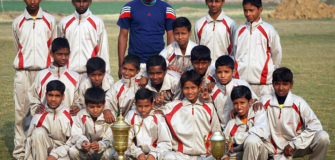‘Discipline need of the hour’, feel most umpires
Share
‘Discipline need of the hour’, feel most umpires
Domestic tournaments provide great opportunities for the players to showcase their talent, but alas, there is a dark side to our domestic tournaments – players’ gross misbehavior with the umpires.
Consider these:
• A player on the bench abuses the umpire against his decision. After persistent abuse, the umpire alerts the bench officials, who, in turn, have a word with the player. This is followed by player abusing the officer, in loud voice telling him to “f*** ^^^”.
• Atleast two KSHA Super Division League matches were stalled as teams would walk out protesting umpires’ decision. Once a players’ desperation was so high that he forgot even the presence of media and officials, and used abusive words at the umpire.
• A first timer journalist had to say this after listening to a player’s foul language after being yellow-carded.: “After school, this is the first time I heard this kind of language. This is sick.”
• A team’s manager gave a mouthful to the tournament officials after one of his players was red-carded. The player was in the team for the next match!
Dominic Savio, a much respected umpire at the KSHA League, has been umpiring at various matches played between big teams. He says, “Sledging and use of foul language by the players for the umpires is very common during a domestic match. Most umpires go through extreme pressure situations. Often players shout at the umpires, indulge in stick-tackling, push their opponents and get into tactics that Hockey doesn’t allow. Had it been an international match, the number of cards would have been much more.”
To substantiate his claim, he quotes an example of the match between India and England at the Chile Olympics Qualifiers, 2008. An Indian player pushed an opponent and was shown the Yellow Card.
Even K Krishnamurthy, KSHA Secretary, a former International umpire, who umpired a few matches at the KSHA league, admitted, “The pressure on local umpires is very high. Players from top-notch teams tend to test the local umpires in the group situation.”
Raghu Prasad, an international umpire, officiating at the KSHA League, was milder, “There is always a good and a bad day. Players have to accept the umpire’s verdict. There is no way out. After all, the umpire is the better judge of what’s happening on the field.”
Dominic knows the pressure that players go through, “In crunch games, they want to win at any cost. That is why they indulge in such acts.”
Having faced many such heated situations in the past and at the recently concluded league, with the players getting away with it, Dominic feels thankless.
”I umpire only for my passion and love for the game. It’s common sense that the players are down by a goal and low because of the high pressure game. If I say a word, the situation goes haywire and becomes a confrontation. I just tell them to go back. If I am confident about my decision, I stay firm.”
While Dominic feels that a code of conduct is very much essential in domestic tournaments, Raghu tends to be a little philosophical, “Code of conduct should come from within the players. This is not the last game of their lives. They should remain positive about the outcome of a game and not think that the umpire is responsible for their defeat in any game.”
Both feel that the domestic committees should be more empowered on handling such issues.
But there is a bigger problem at hand. We don’t have any umpires clinic or any developmental programs for umpires. Dominic sighs, “We have a long way to go. We don’t have that many international umpires. We access the net for updated rules. Learning is only through practical training. Even the players don’t know the updated rules. They make errors and learn from them.”
Raghu also admits that the quality of umpires is very low but points out to a more basic issue,
“With very low remunerations, not many young umpires are taking up umpiring. Of what I have seen, players, after their playing days are over, take up umpiring. In other countries, young people take up umpiring.”
Both Dominic and Raghu, want video referrals to be used at the domestic level. Raghu says, “With ball travelling at 150 km/hr and so many legs in the striking circle, there is a chance to err. We should have video referrals at the domestic level, the way we have at the international level.”
Supporting Raghu’s claim, Dominic says, “Domestic tournaments need video umpiring, desperately. We play Hockey where the ball moves around quite a bit in the circle and that makes it very difficult for the umpire to give a correct decision.”
Umpires being in love with Hockey as much as a Hockey player is, how does it feel when players misbehave with the umpires? Raghu says, “I feel bad when I am yelled at.” On the other hand, a nonchalant Dominic says, “I don’t react. I prefer to smile and move on.”
A top team’s coach shared the fact that in international tournaments, officials are usually stricter with Indian players because of their history of misbehaviour.
If one wants to erase this, the start has to be made at domestic hockey.


